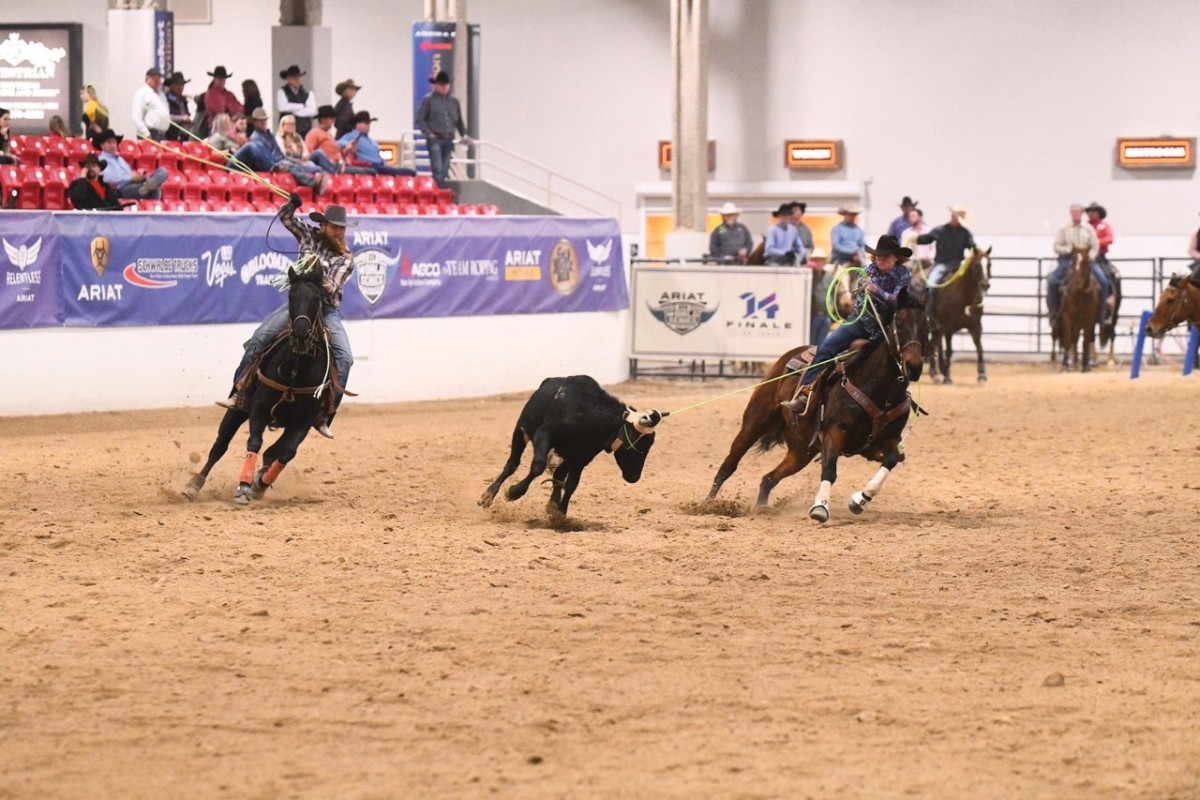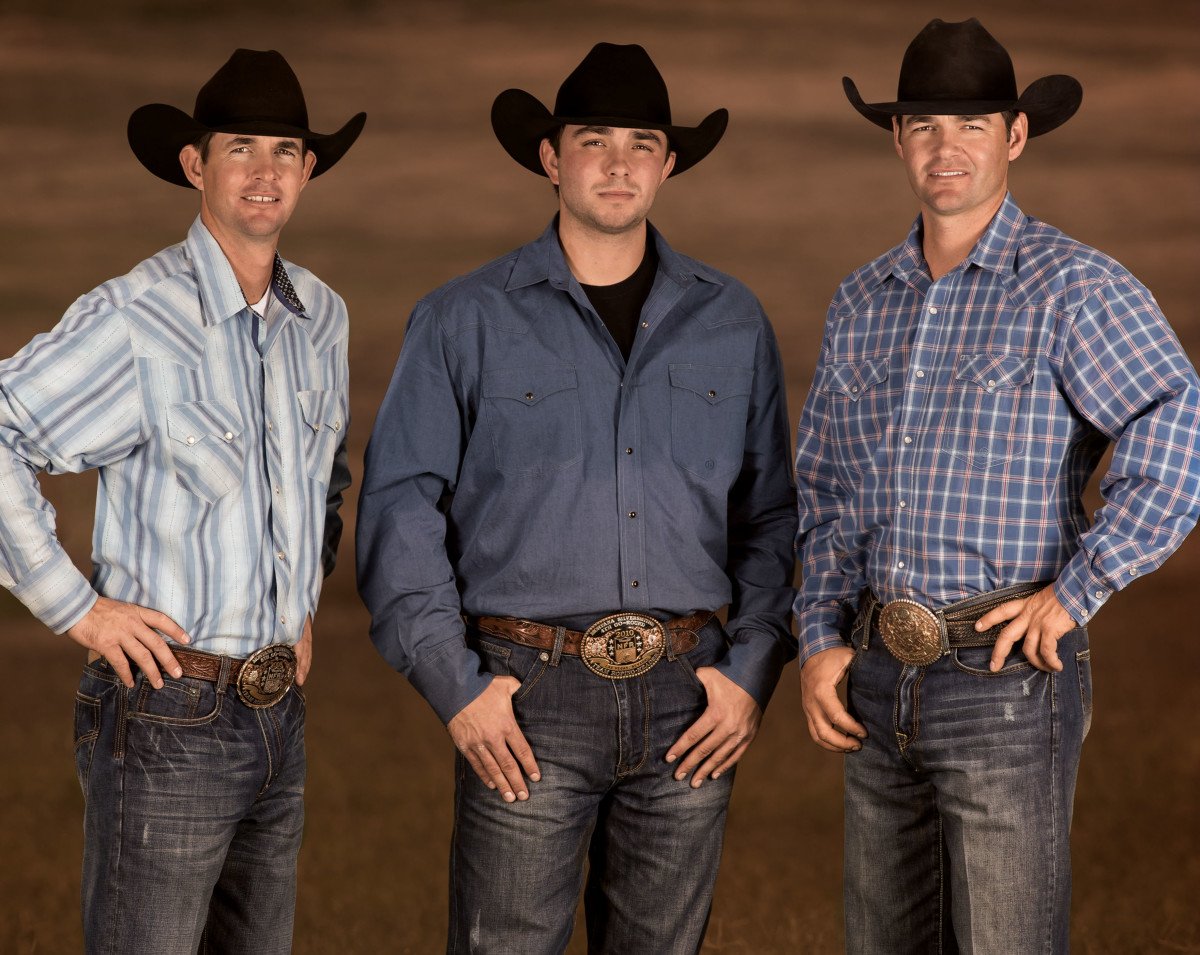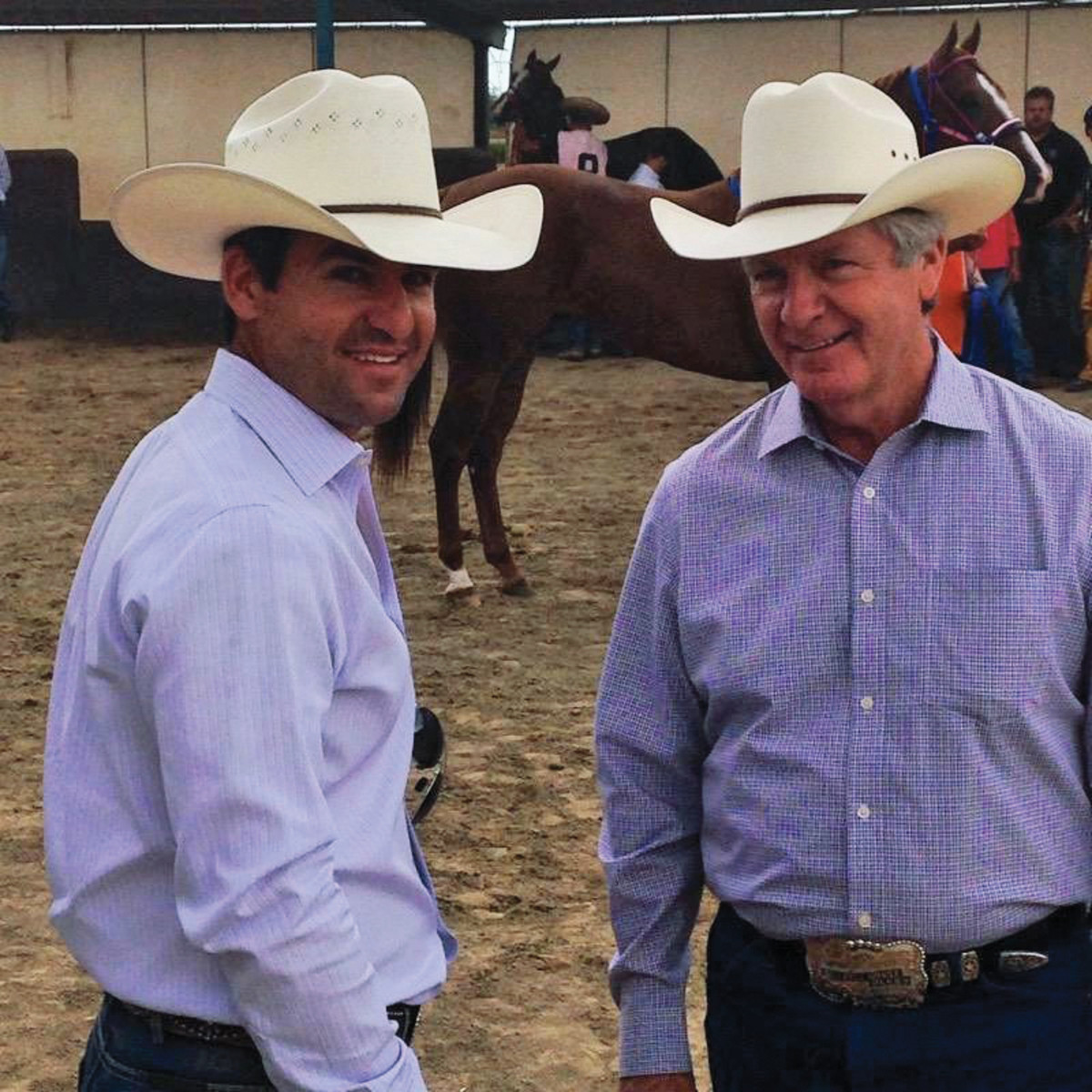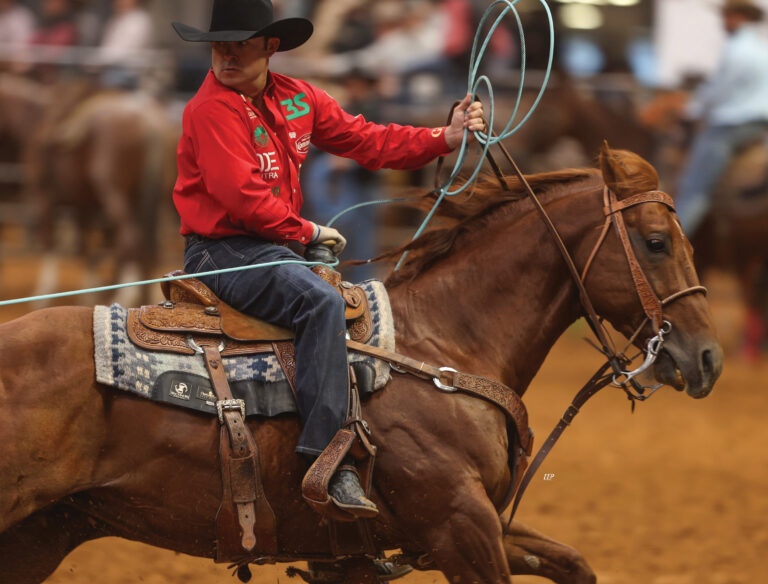In 1966, President Lyndon B. Johnson designated the third Sunday in June as Father’s Day, and six years later, President Richard Nixon signed it into law. Luckily, the holiday is annual. Because there are so many team roping dads and granddads worth honoring that we could go on for years.
In the meantime, here are a few fathers worthy of accolades.
Papa Smurf
The passing of the gold-buckle baton from Jake ’n Clay to Speed ’n Rich in the mid-1990s overshadowed wolfy West Coast NFR team ropers like Daniel and Chris Green, Wes and Cameron Moore, and the late Mike Boothe.
But they were tough. And they all came through Bruce Hunt’s program at West Hills College in Coalinga, California. Hunt, a Canadian, left his own promising full-time rodeo career to mentor those kids and his own with his wife, fellow roping ace Liz Hunt.
“We always had a handful of college students sleeping in the living room the first few weeks of school,” recalled Hunt’s oldest daughter, Nora Hunt-Lee. “They called him Papa Smurf.”

Keeping good steers in front of teenaged boys who ride high and duck hard can be challenging. But winners like runner-up world champ Daniel Green (10 times to the NFR) weren’t Hunt’s only success stories. He also provided a fatherly shoulder to team roping students Dustin Noblitt —now the president of Pro Equine—and Randy Bernard. The former CEO of PBR and of IndyCar more recently founded RFD-TV’s The American with USTRC sanctioning and, now, WSTR bonuses.
[SHOP: USTRC Sponsors]
Equibrand 20 X 20 Classic Equine Portable Nylon Fan Bag
Heel O Matic Bones Heading Dummy
RESISTOL Men’s USTRC Big Money Hat
Noble Outfitters Roping Gloves
(As an Amazon Associate, we earn from qualifying purchases made through affiliate links.)
“I was as hands-on as I could be,” Hunt recalled. “I just wanted to give them opportunity. A lot of times, kids didn’t have 30 steers and four practice horses. But they got to school and all of a sudden they could practice as much as they wanted. College rodeo gave them the chance to get a degree and then exceed that in business.”
Hunt also claims paternity to one of the most sought after headers in the WSTR. Hunt-Lee lives in Fallon, Nevada, with her husband, steer contractor and producer Tommy Lee. In 2017, Hunt-Lee and Brady Black placed third in the #11 at Finale XII to earn $167,000. Last December, she and Justin Johnson placed second—by two-tenths of a second—in the #10.5 to earn $257,000.
Hunt taught his firstborn to win early on. With her grass rope and piggin’ string, she was the NIRA Rookie of the Year for her dad and won 12 individual regional collegiate titles as she led UNLV to a women’s national championship. Yes, 12. Plus, she won two WPRA world championships—with her dad driving for her. She also team roped, although those opportunities for females were scarce.
“We put on one of the first all-female jackpots in the country,” Hunt said. “We called it our Bad Girls Roping. There wasn’t any place then for girls to rope. We paid a thousand bucks to first, and a saddle. That was nothing by today’s standards, but back then, it was a really big deal.”
He admits pushing Nora hard as a kid. She thrived on it.
“Dad and his buddy, Walt Garrison, always said, ‘The harder you work, the luckier you’ll be,’” Hunt-Lee recalled. “Plus, my dad taught me that faith is really important. He always told me I could win a roping with a string of baling twine and a cheap horse.”
It worked. When she was a little girl, “Norie” and her dad would say their prayers at night and do their positive affirmations. But she took the mental game to the next level, getting a doctorate in counseling. Today, Dr. Nora Hunt-Lee is a coach with a clientele list that include NFR ropers. But she still fondly recalls making rope horses with her dad out of $1,000 cutting rejects, because they didn’t have much money.
“He sacrificed any time and resources he had,” Hunt-Lee said. “He had the same dream I did. My mom and dad never said no when it came to roping.”
That philosophy is also benefitting Hunt’s grandkids. Little Stella Lee can already draw a knot on a sled’s horns from her pony—and she’s 6. Her 9-year-old brother, Stix, ropes both ends so well that he has a Cactus Ropes endorsement. Grandpa Hunt is right there every day, turning steers out. He and Liz moved about a mile down the road from the Lees as soon as he retired in 2014.
[SHOP: Cactus Ropes]
“I’m getting to relive this a second time,” Hunt said. “I’ve got to be careful not to be too pushy. After 31 years of coaching, it’s hard to shut up.”
The Hunts are plenty proud of their other daughter Anna Hunt-Burch—the first female to raise and haul her own bucking bulls to the PBR World Finals—and son Clay—a former bull rider, who also recently moved to Fallon. He wants to get into team roping after watching Nora haul $212,000 home from Vegas in three years. The Finale is her lick, says her dad, because of her attitude.
“If you go there and plan to walk out with 10 grand, it ain’t going to happen,” he offered. “When you try too hard, it’s like a hot engine—everything wants to seize up. When you’re relaxed and your mind is in the right place, you let things happen.”
Nora plans to let it happen again this December. But she wants first place, this time. And she’ll lean on that faith she learned from Dad.
“That guy who won two ropings in Vegas a couple of years ago?” she asked. “I was his biggest fan. If he can win two finales in one year, that means I can!”
Montana proud
Early in 1985, despite having just heeled at his first NFR and despite being drafted by Coca-Cola for the Winston Tour, Dennis Tryan was lured by fatherhood back to Big Sky Country for good.
“One night, I woke up in the sleeper and looked down and we were going 100 mph trying to get to Clovis, New Mexico, in time for the rodeo,” Dennis recalled. “My kids were about to start baseball in Montana and I thought, ‘Here I am. I don’t even like this. I just loved to rope—not make the NFR.’”

It paid off for his boys, who each turned out so handy with a head rope that, in January, the whole family was inducted into the Montana Pro Rodeo Hall of Fame. At the induction, Dennis, of Huntley, said that when he ran his first steer as a teenager, he’d never have dreamed his sons would rack up 30 NFR team roping qualifications and three gold buckles. Dennis’ wife, Pat, and their children—Matt, Taylor, Brady, Travis and Clay, and their families—are all still involved in the sport, producing or competing. Clay and Travis’ mom, NFR barrel racer Teri Kay Kirkland, lives in Billings.
“He did a good job,” said Clay, who recently went to see the old arena near the Canadian border, where his dad learned to rope. “He needs more credit; he doesn’t take any. He doesn’t really say much about it, but no one else has even come close to raising three boys who team roped at the NFR.”
[SHOP: Clay Tryan’s Tools of the Trade]
Clay, Travis and Brady made history by going to the Big Show the same year in 2010.
“I thought it was going to be so much fun to have my kids all there at once,” Dennis recalled. “But it wasn’t, because they don’t all win every night! One’s happy and one’s mad and so on.”

That year was undoubtedly his proudest. But his favorite memory over the decades was just all of it.
“Every weekend we were driving together, tired together, losing together, winning together, going through it all together,” Dennis recalled.
When the boys were little, their dad could easily have entered the big rodeos, Clay remembers. Instead, he partnered with them at the amateur rodeos. They spent a gazillion hours in the living room, picking apart the good headers on NFR or BFI or Tubac tapes.
“Dad was on our case pretty good about roping, but not everyday life,” Clay said. “He didn’t tell us to rope. We wanted to be good and we told him we wanted to be good. Once we told him, then it got real.”
Practicing hard was one thing, but even more important to Dennis when the boys were young was that they never talked about quitting when things weren’t going well.
“I never had that attitude nor let them have it,” Dennis said. “We’d stay hooked until the end. It was one of my things.”
Without that, one of the greatest headers of all time would have quit far too early.
“It was the end of my first season, 1999,” Clay remembered. “I’d spent my money and crippled my horse and ended up 21. It was a miserable experience. But Dad let us know it’s tough for everyone, no matter how good you ever get. No one ever feels like, ‘I got this.’ ‘You’ve got to keep grinding,’ he’d say. ‘There ain’t nothing for you here.’”
Family businessmen
Gary McKinney is too modest to tell you about the billion-dollar oil-and-gas conglomerate he built from scratch in West Texas, or that he and his son won the richest Quarter Horse race in history (at the time), or what he’s done for rodeo via his backing of the World Champions Rodeo Alliance (WCRA).

“My father’s family motto is ‘It’s nice to be important, but it’s more important to be nice,’” Micah McKinney, 40, said. “He kind of raised me that way—to stand by that. No matter who you are or what you do or where you’re from, it’s just important to be nice.”
It’s telling that Gary is as proud of his daughter, M’Lissa Schoening, for the “nice family” she’s raised as he is for her pivotal work within his Midland-based Reliance Energy. Meanwhile, Micah is a partner with his dad in the racehorse and rope-horse production business, Reliance Ranches. He and his kids live in the greater Llano area, as do Gary and his wife, Sheila.
As a team, Micah and Gary were regulars in recent years at the pay window of Perry di Loreto’s #11 Invitational. The Texas Tech alums also placed last December at the Ariat WSTR Finale XIV in the #10.5, with Gary tying on for the first time.
[SHOP: Ariat World Series of Team Roping Sponsors]
“He always roped, but it took me a while to get in a lifestyle where I could focus on roping,” Micah said. “I wish I’d have done it earlier. He was laid back and was always a really good coach.”
Gary’s own father, who labored around drilling rigs his whole life, died when Gary was 18. As for Gary, he packed his son with him everywhere—even to the oilfield—all the time. They’ve been best friends since Micah was about 3.
“I didn’t learn to rope ‘til I was 30, when I could afford a horse,” Gary said.
Today, father and son enjoy fishing, hunting, golfing or roping together during the rare moments they’re not crazy-busy sorting horses and cattle or repairing things with their bare hands or building businesses. A highlight year was 2013, when they won the All American Derby and also bought the Lazy E Arena. Micah admires his dad’s vision—Gary’s penchant for looking ahead and tackling everything from the current oil bust to doping in horse racing, to problematic business models in rodeo.
“We’re trying to make rodeo a sport that can provide the guys with a great living, like golf or tennis,” Gary said. “Rodeo has the potential to do that, if we could just get everybody pulling in the same direction. We want alliances that complement each other, not compete with each other. There’s no template for this.”
Micah points out that under Gary’s leadership, the WCRA has awarded cowboys more than $7.3 million in two years.
“The guy’s ambition is unlimited,” Micah said. “He instilled in me that nothing’s ever too big to try. And if you see something not working, you make an effort to fix it. I try to put that in my kids, too.”











